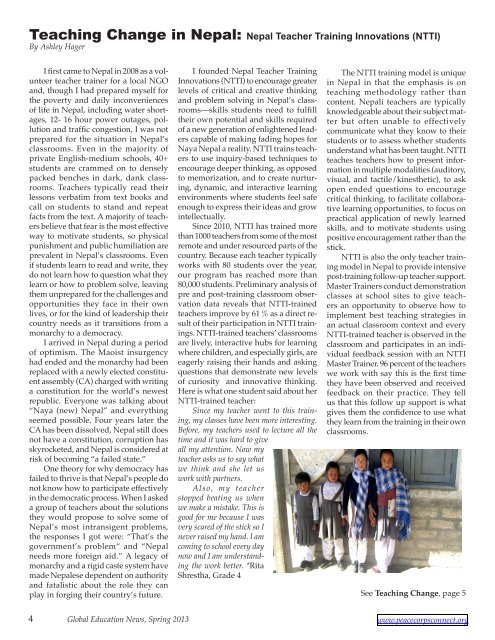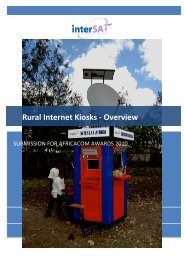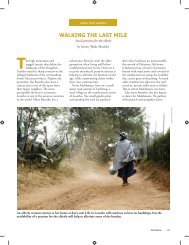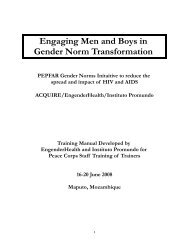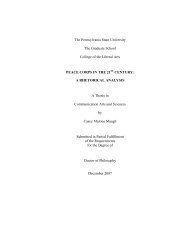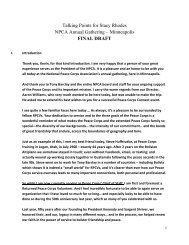Spring - National Peace Corps Association
Spring - National Peace Corps Association
Spring - National Peace Corps Association
You also want an ePaper? Increase the reach of your titles
YUMPU automatically turns print PDFs into web optimized ePapers that Google loves.
Teaching Change in Nepal: Nepal Teacher Training Innovations (NTTI)<br />
By Ashley Hager<br />
I first came to Nepal in 2008 as a volunteer<br />
teacher trainer for a local NGO<br />
and, though I had prepared myself for<br />
the poverty and daily inconveniences<br />
of life in Nepal, including water shortages,<br />
12- 16 hour power outages, pollution<br />
and traffic congestion, I was not<br />
prepared for the situation in Nepal’s<br />
classrooms. Even in the majority of<br />
private English-medium schools, 40+<br />
students are crammed on to densely<br />
packed benches in dark, dank classrooms.<br />
Teachers typically read their<br />
lessons verbatim from text books and<br />
call on students to stand and repeat<br />
facts from the text. A majority of teachers<br />
believe that fear is the most effective<br />
way to motivate students, so physical<br />
punishment and public humiliation are<br />
prevalent in Nepal’s classrooms. Even<br />
if students learn to read and write, they<br />
do not learn how to question what they<br />
learn or how to problem solve, leaving<br />
them unprepared for the challenges and<br />
opportunities they face in their own<br />
lives, or for the kind of leadership their<br />
country needs as it transitions from a<br />
monarchy to a democracy.<br />
I arrived in Nepal during a period<br />
of optimism. The Maoist insurgency<br />
had ended and the monarchy had been<br />
replaced with a newly elected constituent<br />
assembly (CA) charged with writing<br />
a constitution for the world’s newest<br />
republic. Everyone was talking about<br />
“Naya (new) Nepal” and everything<br />
seemed possible. Four years later the<br />
CA has been dissolved, Nepal still does<br />
not have a constitution, corruption has<br />
skyrocketed, and Nepal is considered at<br />
risk of becoming “a failed state.”<br />
One theory for why democracy has<br />
failed to thrive is that Nepal’s people do<br />
not know how to participate effectively<br />
in the democratic process. When I asked<br />
a group of teachers about the solutions<br />
they would propose to solve some of<br />
Nepal’s most intransigent problems,<br />
the responses I got were: “That’s the<br />
government’s problem“ and “Nepal<br />
needs more foreign aid.” A legacy of<br />
monarchy and a rigid caste system have<br />
made Nepalese dependent on authority<br />
and fatalistic about the role they can<br />
play in forging their country’s future.<br />
I founded Nepal Teacher Training<br />
Innovations (NTTI) to encourage greater<br />
levels of critical and creative thinking<br />
and problem solving in Nepal’s classrooms—skills<br />
students need to fulfill<br />
their own potential and skills required<br />
of a new generation of enlightened leaders<br />
capable of making fading hopes for<br />
Naya Nepal a reality. NTTI trains teachers<br />
to use inquiry-based techniques to<br />
encourage deeper thinking, as opposed<br />
to memorization, and to create nurturing,<br />
dynamic, and interactive learning<br />
environments where students feel safe<br />
enough to express their ideas and grow<br />
intellectually.<br />
Since 2010, NTTI has trained more<br />
than 1000 teachers from some of the most<br />
remote and under resourced parts of the<br />
country. Because each teacher typically<br />
works with 80 students over the year,<br />
our program has reached more than<br />
80,000 students. Preliminary analysis of<br />
pre and post-training classroom observation<br />
data reveals that NTTI-trained<br />
teachers improve by 61 % as a direct result<br />
of their participation in NTTI trainings.<br />
NTTI-trained teachers’ classrooms<br />
are lively, interactive hubs for learning<br />
where children, and especially girls, are<br />
eagerly raising their hands and asking<br />
questions that demonstrate new levels<br />
of curiosity and innovative thinking.<br />
Here is what one student said about her<br />
NTTI-trained teacher:<br />
Since my teacher went to this training,<br />
my classes have been more interesting.<br />
Before, my teachers used to lecture all the<br />
time and it was hard to give<br />
all my attention. Now my<br />
teacher asks us to say what<br />
we think and she let us<br />
work with partners.<br />
Also, my teacher<br />
stopped beating us when<br />
we make a mistake. This is<br />
good for me because I was<br />
very scared of the stick so I<br />
never raised my hand. I am<br />
coming to school every day<br />
now and I am understanding<br />
the work better. *Rita<br />
Shrestha, Grade 4<br />
The NTTI training model is unique<br />
in Nepal in that the emphasis is on<br />
teaching methodology rather than<br />
content. Nepali teachers are typically<br />
knowledgeable about their subject matter<br />
but often unable to effectively<br />
communicate what they know to their<br />
students or to assess whether students<br />
understand what has been taught. NTTI<br />
teaches teachers how to present information<br />
in multiple modalities (auditory,<br />
visual, and tactile/kinesthetic), to ask<br />
open ended questions to encourage<br />
critical thinking, to facilitate collaborative<br />
learning opportunities, to focus on<br />
practical application of newly learned<br />
skills, and to motivate students using<br />
positive encouragement rather than the<br />
stick.<br />
NTTI is also the only teacher training<br />
model in Nepal to provide intensive<br />
post-training follow-up teacher support.<br />
Master Trainers conduct demonstration<br />
classes at school sites to give teachers<br />
an opportunity to observe how to<br />
implement best teaching strategies in<br />
an actual classroom context and every<br />
NTTI-trained teacher is observed in the<br />
classroom and participates in an individual<br />
feedback session with an NTTI<br />
Master Trainer. 96 percent of the teachers<br />
we work with say this is the first time<br />
they have been observed and received<br />
feedback on their practice. They tell<br />
us that this follow up support is what<br />
gives them the confidence to use what<br />
they learn from the training in their own<br />
classrooms.<br />
See Teaching Change, page 5<br />
4 Global Education News, <strong>Spring</strong> 2013 www.peacecorpsconnect.org


